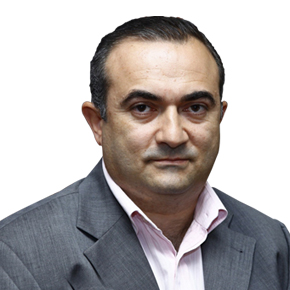Achieving economic and social progress requires responsibility, vision, discipline, cooperation and most of all understanding mutual interests and partnership for development. The youth of Armenia have clear, distinct and strong personalities well manifested over the history of the last decades and proven in times of war, turbulence and social disorder. It is now the time for a new vision in which the youth from the regions of our country should understand that their similarities and common interests are more important than their differences and via cooperating within a mainstream framework they can all benefit thus creating a new environment of young leaders striving to provide security and peace in Armenia. Moreover, if such a common vision is shared by the young leaders the differences will work for consolidation for change as well as the similarities do.
Forming public institutions, making an impact upon government authorities via creation of public requirements towards the liquidation of a range of negative social compounds is one of the critical issues, where conflict management skills, as well as lateral leadership and cooperative decision-making interests of a majority of society members are found, hence, to be considered the crucial task both for the whole society.
It is usual situation here in Armenia and in our everyday live that when any group is trying to come up with joint solution to a problem we could spend a whole day to argue with each other without looking for a solution. This is perhaps true for all groups, sectors, organizations and institutions are it family, local businesses, inter-ministerial proposals, Parliament, etc. Hence, experts in different sectors strongly need to transferee skills and technique to discuss, negotiate and lead, finding compromises to be able changing our own perceptions upon getting new information and eventually to create environment of cooperation. Moreover, a network of specialists and experts in various areas cultivated on the bases of common knowledge, skills and attitudes is the backbone of transformation and changes.
Such a network can play a key role in public education and new skills development in Armenia since they allow different groups to work together toward a shared goal by coordinating strategies and pooling resources. One of those successful networks effectively and actively operating in Armenia at present is considered to be Momentum Network created on the bases of Momentum Program implemented by in its time Conflict Management Group (CMG) and now Conflict Management Partners (CMP) since April 2000. The program is designed to equip young leaders of Armenia from different sectors with conflict management skills for more effective policy development and self-governance through a series of tailored workshops and follow-up support and training in the region. The goal of the program is to assist young promising decision-makers from Armenia to acquire the leadership skills necessary to turn our country into more democratic and prosperous entity to hold its place in the world politically and economically.
The proven achievements of the Momentum Network in Armenia have shown that use of leadership and negotiation training can produce the fundamental changes necessary for large-scale socio-economic and political reform. However, up to this point, this ability has been limited to the individual and small group level. The ultimate success of the Momentum Network and subsequent efforts at reform depends on ability to expand its capacity and the application of new methodologies and a range of activities.
Having developed a critical mass of young professionals from various layers of public and private sectors in the fields of economics, mass media, both state and local governance, education, legal sphere within Momentum Network, there is need for the new steps aimed at building bridges of trust, respect and mutual support among young decision-makers of not only in Armenia but also the region.
Tevan Poghosyan is the Executive Director of International Center for Human Development (ICHD). These views are his own.

















Comments
Dear visitors, You can place your opinion on the material using your Facebook account. Please, be polite and follow our simple rules: you are not allowed to make off - topic comments, place advertisements, use abusive and filthy language. The editorial staff reserves the right to moderate and delete comments in case of breach of the rules.